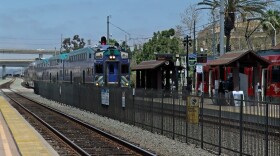Voters in Bolivia's richest province, Santa Cruz, voted in large numbers to adopt autonomy measures in defiance of socialist President Evo Morales, who has declared the move invalid. But NPR's Julie McCarthy says the vote very likely means the region has officially started on the road to statelike independence.
Exit polls conducted by local television stations said more than 85 percent of the nearly 1 million electorate approved the referendum Sunday after a day of balloting marked by sporadic clashes that left one dead and at least 20 injured. "The vote drew huge crowds ... agitating for autonomy," McCarthy says. In a neighboring town, "the crowd stretched for 3 miles."
On Monday, provincial leader Ruben Costas was officially named "governor" of Santa Cruz, and in 90 days, locals will head to the polls again to elect state legislators. McCarthy says Morales — the country's first indigenous leader and a committed leftist — is still fighting the measures but faces an uphill battle.
No matter how legitimate the vote, McCarthy stresses that the people aren't aiming for secession, just more autonomy. "It's not about independence from the state of Bolivia," she says. "No matter where you are ... there is this deep, deep sense of being Bolivian."
Rather, McCarthy says, the referendum is a step toward bucking the awesome centralization of power and authority in the federal seat of La Paz. "It would give to Santa Cruz all the powers, say, a state in the U.S. would have," she says, noting that there are hotels in La Paz that offer special rates for people from around the country who are forced to visit the capital to conduct regular business, such as renewing ID cards. "Everyone has to do their business with La Paz. ... [The referendum is] about centralization and blowing apart that centralization that's driving everyone crazy."
Undoing a cumbersome federal bureaucracy might sound like a reasonable goal, McCarthy says, but any threat to federal power undermines the platform of Morales' candidacy, which outlined a national project of equitable redistribution of land, wealth and industry.
McCarthy says the argument, by and large, is between the wealthy, landowning leaders of Bolivia's hydrocarbon industry in the east and their mountainous, more indigenous neighbors in the western part of the country. "You can't swing a cat here in Santa Cruz and not hit somebody who will somehow cast this whole question ... as a question of work," she says. People in the east, closer to Brazil, typically lighter-skinned and wealthy, say they don't want to carry the poor. "They want to hold on to the power they've had historically," McCarthy says.
The referendum push is already bleeding into other Bolivian provinces. "Autonomy fever is sizzling here," McCarthy says. "There are at least three other states on line to hold their own versions of autonomy."
Copyright 2022 NPR. To see more, visit https://www.npr.org. 9(MDAzMjM2NDYzMDEyMzc1Njk5NjAxNzY3OQ001))






